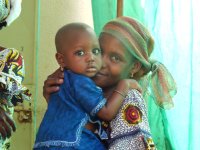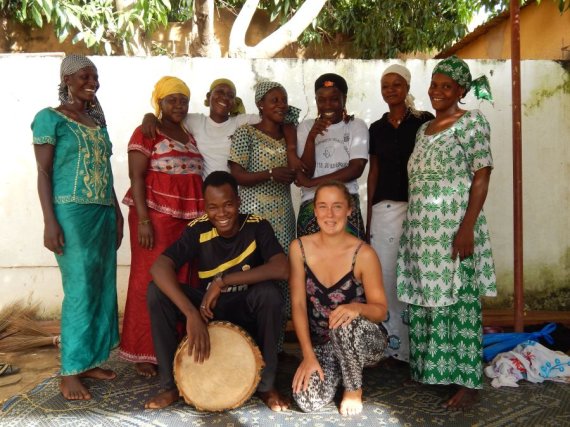She has been back in the Netherlands for nearly a month, but in her head, Master’s student Linda Schoorl (25) is still in Mali. She was supposed to spend four months there, on an internship, but she had to come back after two months: the risk of ebola was thought to be too great. ‘It is strange to be back,’ she says halfway through our conversation in the Orion canteen. ‘I don’t really know what to do with myself; my room is sublet until December. I’ve got culture shock. In the Netherlands everything has stayed the same, but I have changed. I would rather go back.’The student of Development and Rural Innovation ended up in Mali by chance. ‘It made no difference to me where I did an internship, as long as I could do something to do with theatre. Theatre is an incredibly good way of getting to know each other quickly and deeply, and of bridging cultural differences.’ Through her network she got a place at an NGO, Miriyawale, in Sikasso, a town in the south of Mali. She was to teach drama to women there. Mali was already surrounded by countries affected by the ebola epidemic, but this Argo rower did not let that put her off. ‘People around me found it very worrying, and wondered why you would go to a region where there was a chance of an ebola outbreak. But I was not worried. Mali is so incredibly big. In the Netherlands we are not afraid of falling ill if there is a flu epidemic 1000 kilometres away, either.’
SIMPLE LIFE
Linda quickly felt completely at home in Sikasso. In an email to family and friends she wrote: ‘People here understand the art of doing nothing, of waiting and enjoying. Hours spent staring ahead of you, with the same view every day. And nobody whines that life is not good enough. I like that and I am beginning to be able to do it myself. The days are good just as they are (…) I am discovering that it makes me very happy to have less stuff, fewer appointments, and be less busy. Living more simply makes me stronger.’‘I don’t really relate to the mentality in the Netherlands,’ she explains. ‘All that busyness, everything must be done quick-quick, studying, writing reports, making a career… I prefer to work on something practical. That makes me feel better than studying in an office at the university or only learning theory.’

In the community centre in Sikasso, run by a Dutch woman, Linda set to work with a women’s theatre group. The idea was to perform a play for the whole community on a subject they chose themselves. After the lessons, they would eat together and the conversation soon turned to the subject of a healthy diet. The women had a lot of questions. Linda: ‘Health is not part of their culture. It is very normal to eat rice twice a day, just with peanut sauce. So a lot of people are overweight and children have swollen bellies because of vitamin and mineral deficiencies. Vegetables and fruit are not expensive and there is plenty available, but people hardly buy them. I thought, this is a good topic for the play. I can make a difference to their lives in a short time.’
The women tackled the theme with enthusiasm, but before Linda had really got things going, she received an alarming message from the Netherlands: an ebola death in Mali. ‘My boyfriend has seen it on a news site. A two- year-old Malian girl had been on a bus that had driven through the whole country. She had all the symptoms: her nose was bleeding throughout the whole journey.’Panic did not break out at once in Mali, but to be on the safe side the community centre closed temporarily. So the drama lessons stopped too. Linda got in touch with the university, but there is no protocol for situations like this. Her family were worried. The health insurance company advised her to come home: the costs of repatriation would not be covered if she fell ill. ‘But I didn’t want to come back at all. I was so enjoying myself there. I thought the reactions in the Netherlands were much too panicky.’ But it was not an option just to wait and see. ‘If the centre stayed closed I had nothing to do. Even the director of the centre said I should go home. That evening in bed I cried my eyes out, I was so upset about it.
WHITE SUITS
At the airport she could see that the news about ebola was having an impact. ‘There were people walking around in white suits and on the plane my temperature was taken with one of those infrared thermometers. The hand baggage in the compartments above the seats was sprayed with disinfectant.’ None of this worried her. ‘I thought it was all a bit sloppy. Because next to the man in the white suit was a customs officer without any protection at all.’But when a man sitting two rows in front of her became ill, she did feel a little uneasy. ‘He was taken off the plane in Lisbon by men in white suits. I did quickly think back to see whether I had had any contact with that man. And yet at the same time I thought: I am not going to let myself get worked up about this. How much chance is there of my getting ebola? The chances of malaria, typhoid or TB are much greater, because those are still common diseases.’
Back in Wageningen, Linda has not managed to get back into the swing of things. ‘It is nice to see everyone again, but I also want to finish what I started. I have reverse homesickness: I so long to go back. I was happy in Mali because I felt I was doing something meaningful, and because I had found a place in the world where I feel at home. Now there have been a few confirmed cases of ebola in Mali, which will probably mean stricter safety precautions. So there is no question of going back for the time being. I am going to continue my internship as well as I can using Skype. I can sort of accept that, but not really yet.’
Photo: Linda Schoorl

